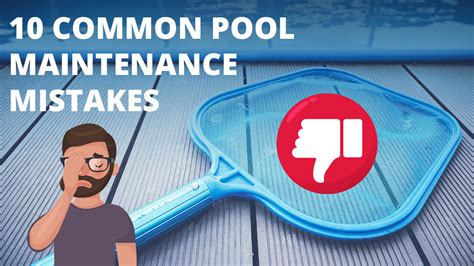Pool Cleaning Mistakes That Cost You Money
Keeping your pool sparkling clean isn't just about aesthetics; it's about protecting your investment and avoiding costly repairs down the line. Many pool owners, even experienced ones, make common cleaning mistakes that can lead to significant expenses. This article will highlight these pitfalls and provide solutions to help you save money and maintain a healthy, beautiful pool.
Ignoring Regular Cleaning: The Silent Drain on Your Wallet
Perhaps the biggest mistake pool owners make is inconsistent or infrequent cleaning. Failing to remove debris daily allows dirt, leaves, and other contaminants to accumulate. This buildup contributes to:
- Increased chemical consumption: More chemicals are needed to treat a heavily soiled pool, significantly impacting your budget.
- Algal blooms: Neglecting regular cleaning creates a breeding ground for algae, resulting in costly treatments and potential damage to pool surfaces.
- Equipment strain: Your filter pump works harder to process a dirty pool, shortening its lifespan and increasing the risk of premature failure. Replacing a pump is a considerable expense.
- Cloudy water: This isn't just unsightly; it indicates an imbalance that requires more intensive and expensive remediation.
Not Backwashing Your Filter Frequently Enough
Your pool filter is your first line of defense against contaminants. However, a clogged filter is ineffective and leads to:
- Reduced filtration efficiency: A clogged filter allows debris to circulate, leading to cloudy water and increased chemical use.
- Higher energy bills: The pump works harder, consuming more energy to push water through a blocked filter.
- Filter damage: Forcing water through a clogged filter can damage the filter media, requiring premature replacement. Backwashing regularly (as per your filter's instructions) prevents this.
Using the Wrong Chemicals or Incorrect Amounts
Improper chemical balancing is a major source of pool problems and expenses:
- Equipment corrosion: Incorrect chemical levels can corrode your pool equipment, leading to costly repairs or replacements.
- Surface damage: Imbalances can damage the pool finish, requiring expensive resurfacing.
- Health hazards: Incorrect chemical levels can create an unsafe swimming environment. Accurate testing and precise chemical additions are crucial.
Neglecting Regular Equipment Maintenance
Ignoring routine maintenance on your pool equipment—pump, filter, cleaner—will inevitably lead to bigger problems:
- Premature equipment failure: Regular inspections, cleaning, and minor repairs prevent major breakdowns and costly replacements.
- Increased energy consumption: A poorly maintained pump, for example, consumes more energy than a well-maintained one.
Failing to Winterize Properly (in colder climates)
For those in colder climates, neglecting proper winterization is a recipe for disaster:
- Frozen pipes: Frozen pipes can burst, causing significant damage and costly repairs.
- Damage to pool equipment: Exposure to freezing temperatures can harm your pool pump and other equipment.
How Often Should I Clean My Pool?
The frequency of pool cleaning depends on several factors, including:
- Pool size: Larger pools require more frequent cleaning.
- Climate: Hot, humid climates promote faster algae growth.
- Number of swimmers: More swimmers mean more debris.
- Type of pool cover: A good pool cover significantly reduces the amount of debris entering the pool.
Ideally, aim for daily brushing and skimming, along with weekly vacuuming. Regular chemical testing and adjustments are essential.
What Are The Signs I Need a Professional Pool Service?
If you're noticing recurring problems, struggling to maintain water balance, or facing significant equipment issues, it might be time to call in a professional. They possess the expertise and tools to identify and address complex issues efficiently, potentially saving you money in the long run by preventing further damage.
By addressing these common mistakes and implementing a proactive maintenance schedule, you can protect your investment, keep your pool sparkling clean, and avoid costly repairs and replacements. Remember that a little preventative care goes a long way in maintaining a healthy and enjoyable swimming environment.

